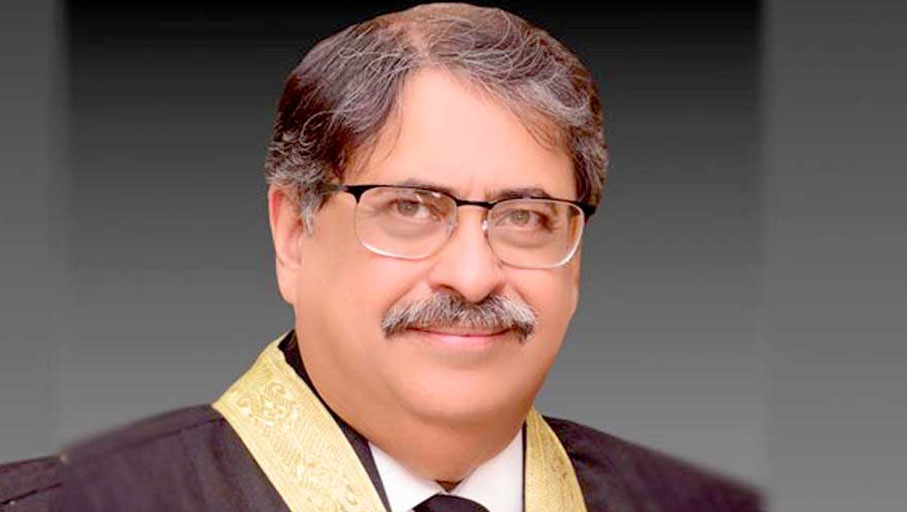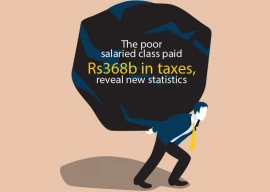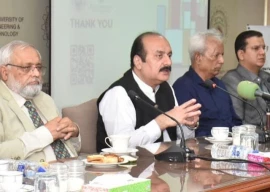
The ongoing tension between two Supreme Court judges is intensifying as Chief Justice of Pakistan (CJP) Qazi Faez Isa has expressed serious concern over Justice Athar Minallah's delay in writing the judgement about the vires of the Excise Act 2005.
The relationship between the two judges has been strained since six Islamabad High Court judges wrote a letter in March this year regarding the interference of agencies in judicial functions.
Both judges indirectly responded to each other's observations during the hearing of the suo motu case regarding the letter from the six IHC judges. The matter is still pending in the apex court, with a clear difference of opinion between them.
When CJP Isa gave some verbal observations in the Senator Faisal Vawda and MNA Mustafa Kamal contempt case, Justice Minallah immediately wrote a letter to the SC Registrar to dispel the impression that the contempt proceedings against them were initiated on his complaint.
Justice Minallah stated unequivocally in his letter that neither any complaint was filed by him nor was he consulted in any manner in this regard.
Both judges also indirectly responded to each other's observations during the hearing of the reserved seats case.
The difference of opinion between them was also evident in the Khyber-Pakhtunkhwa government's plea to allow live streaming of the NAB law amendments case.
Justice Minallah dissented from the majority opinion, stating that live streaming of the case must be permitted.
Interestingly, when Justice Isa took charge as CJP after taking his oath, Justice Minallah was included in Bench no 1.
The three-judge bench led by CJP Isa, which included Justice Minallah and Justice Aminuddin Khan, heard the cases for more than two months.
It is now being observed that Justice Minallah is not included in larger benches hearing civilian trials in military courts or the appointment of election tribunals in Punjab. He is also not part of the bench hearing the suo motu case regarding the murder of Arshad Sharif.
Recent clash
The CJP expressed serious concern over the delay in writing a judgement by Justice Minallah.
He expressed these concerns in his additional note in a consolidated judgment authored by Justice Minallah on a set of appeals regarding Excise Act 2005.
The chief justice says that law and practice require that judgement be written soon after the conclusion of the hearing.
"This case was heard on 6 December 2023 and, on the same day, it was marked to Hon'ble Justice Athar Minallah for writing the judgment. The judgment took over six months to write, or precisely 223 days," the chief justice further revealed.
"His lordship (Justice Minallah sent the judgment to me (chief justice) on 18 July 2024 and the very next day on 19 July 2024 I wrote my note thereon and signed it," the chief justice said.
"If I, as the Chief Justice of Pakistan, do not remind my distinguished colleagues of the aforesaid matters and implore them to decide cases expeditiously I will be shirking my responsibility," the chief justice observed.
The hearing of the case was concluded in December 2023, but the judgment, authored by Justice Minallah, was issued on July 25, 2024, more than six months later.
Interestingly, on December 6, 2023, CJP Isa passed an order stating that all counsels were permitted to file synopses of their submissions within three weeks.
"In case there is need to further hear the learned counsel, these cases will be fixed for hearing otherwise on receipt of written synopsis, we will reserve the judgement," the order authored by CJP stated.
However, CJP Isa did not refer the last order in his note.
CJP Isa in additional note has observed that the Order XX, rule 1(2) of the Code of Civil Procedure, 1908 prescribes that judgments should be written within 30 days.
"It would be most regrettable if the Supreme Court tells other courts to decide cases within a particular time-frame but does not do so itself," the chief justice observed.





_updates1713245447-0/1178596_7858743_Salman-Khan-(2)_updates1713245447-0-270x192.webp)



-(1)1717678110-0/Kendrick-(1)-(1)1717678110-0-270x192.webp)









COMMENTS
Comments are moderated and generally will be posted if they are on-topic and not abusive.
For more information, please see our Comments FAQ